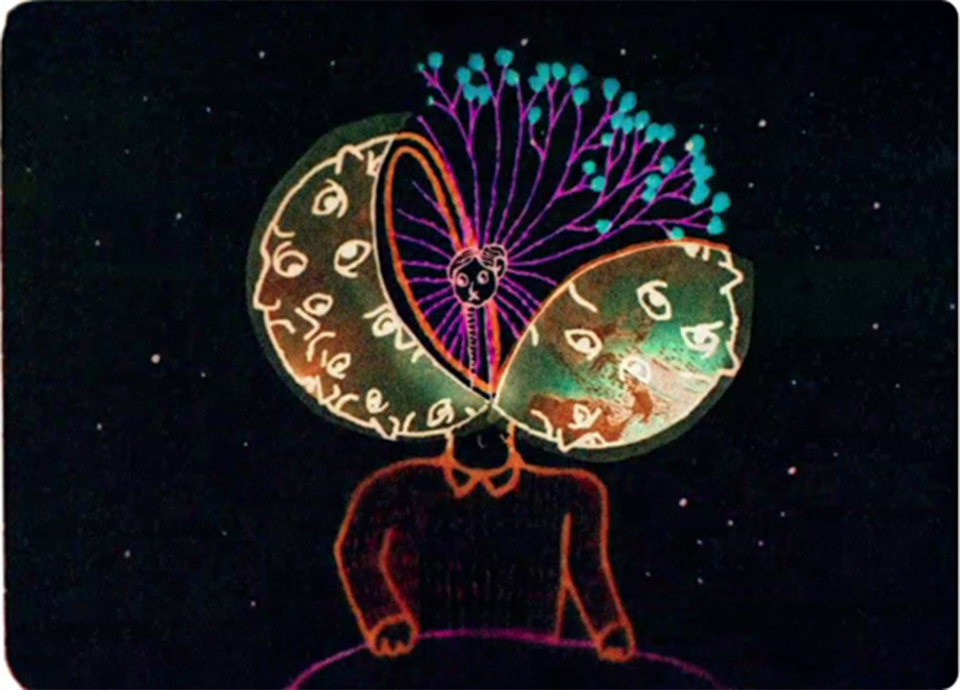
Still from the animated documentary “Is the man who is tall happy?: An animated conversation with Noam Chomsky", directed by Michel Gondry
"Laws as such do not make people better —said Mulla Nasrudin to the King— They must practice certain things, in order to become attuned to the inner truth. This form of truth resembles apparent truth only slightly."
The King, oblivious to the depth of those wise words, wanted to prove hastily that he could impose the Truth. He sent all inhabitants out of the kingdom's walls, forcing them to hand in one truth to be able to come back in. A lie would cost their heads.
And then Nasrudin shows up and says to the Guard Captain that he is on his way to be hanged. Stunned by Nasrudin's wit, they realize that he has checkmated them in the blink of an eye. Smiling, he tops his craft: "So now you know what is the Truth: your truth"
Personal adaptation of «How Nasrudin created the truth»
Since the beginning of time, formulas, potions, rituals and prayers, stories and musical notes have tried to grasp the vastness of life. Each one of us depicts our own world, trying to find meaning, day after day. Amidst an overwhelming ocean of stimuli, we barely filter some micro-drops that we begin to relate to as events. We categorize, attribute emotions, judge, make decisions...
We categorize, attribute emotions, judge, make decisions...
According to some terminologies, these are "heuristics", mental shortcuts that distort the laws of logic and probability in order to render, in a limited time frame, a small part of the information that we can have access to. Phrased that way, they are more than a bias or an error of the human mind – they are a compass that helps us sense currents and streams.
We don't only seek to explain this world in the present, but desire to project ourselves onto it. We go to the Oracles to predict the future, through seeds and songs or an online portal or recalling our dream with the first coffee of the day.
The way these particular interpretations weave into and with each other is the substrate of our interpersonal relationships and how we hold community together. Certain versions of this world have more weight, whether we consent to or defy it. The locus of hegemonic epistemology has mutated over time.
Even though emperors and governors, like the one in our story, tend to shortsightedness and arrogance - their span of control is limited in the extent that they can't rule to the last fiber by themselves. But control doesn't lie only in the throne: it blurs and adopts a thousand heads.
Control doesn't lie only in the throne: it blurs and adopts a thousand heads.
A genealogy in strokes
Let's leap back in time: London. November 1834. We are dining in a distinguished house, sharing table with the host Mary Somerville and her husband William, the young Ada Lovelace and Babbage.
Mary charms us with stories about the orbit dance of Uranus and ultraviolet magnetism whilst we nibble on our plum pudding. Babbage provokes everyone in the room with a thirsty fascination of mechanics: a self-sufficient programmed weaving loom, an automatic mechanical calculator...
That night complicities sprout. A drift that will turn into the first computer algorithm developed by Ada.

Babbages Analytical Engine, 1834-1871. Source: Wikimedia Commons

Babbages Analytical Engine, 1834-1871. Source: Wikimedia Commons
In a nutshell, algorithms are a sequence of steps (instructions/rules), clear and concise, that perform certain tasks in a limited span of time.
Algorithms are a sequence of steps (instructions/rules), clear and concise, that perform certain tasks in a limited span of time.
In earlier centuries Arab mathematicians who were more eager to solve "real" problems (as opposed to Greeks mathematicians with their head for the abstract) developed the principles of algorithms and cryptography.
The algorithm hype and boom along with most "formal" scientific and mathematical development, erupted in the Industrial Revolution where these disciplines consolidated as technological innovation at the service of an emerging capitalism.
A little later, the Second World War bursts in. The young and shy Alan Turing contributes to reducing the massacre of people by developing automatons that are able to confront the Enigma – a machine used by the German Army to send encrypted messages to each other. This master piece that carries his name is considered a fundamental link in Computer Science and Artificial Intelligence.
Post-war algorithms like many scientific advances jump from the military to the commercial field. Martha Poon is going to guide us through the next stepping stones and present us with three types of algorithms that outline an ecology and genealogy: algorithms that assist managers in decision making in the post-war; algorithms that are programmed inside of machines and adjust to external conditions; and algorithms that emerge with the appearance of personal computers (PCs) and distribute information to large audiences.
The fraying edges of algorithmic production
Let's go to the last type of algorithm: algorithms in the internet era. The internet works, essentially, through algorithms: from how data is physically transmitted, how a website loads in your browser, to how secure payments are made online, finding a restaurant for dinner (and maybe a date too through OkCupid or Tinder) or getting life insurance or bank loan.
The internet works, essentially, through algorithms.
Algorithms aren't just moments in History and the problem isn't that they isolate audiences and groups or discriminate. They aren't codes with bad consequences or simply hegemonies that oppress us.
“Hegemonies are constantly negotiated in society”, pointed out Italian Marxist philosopher Gramsci. Google offers us personalized and commodified services in exchange of our loyalty. It could seem like a beneficial trade.
Astrid Mager frames algorithms as a convergence of ideological supra-structure and a material economic base that perpetuate the capitalist system with every click.
Mager argues that capital accumulation, it's power and ability to define lifestyles at a transnational scale is intimately mediated by "new media". But, since internet companies don't operate in a vacuum, we need to go beyond political economy and include ideological frameworks, material practices and socio-political factors when performing a deeper analysis.
We need to go beyond political economy and include ideological frameworks, material practices and socio-political factors when performing a deeper analysis.
Tarleton Gillespie also highlights "the production of the algorithmic as a kind of social justification, a kind of legitimation mechanism". Tarleton invites us to travel to it's contours that fray: the inconsistencies and hesitations in it's censorship, manipulation and discourse. Google hides behind it's shield of technical flawless neutrality by refusing to remove or adjust it's search results index by, for instance, hiding hate speech against feminists. But it has been compliant to withdraw a racist meme of Michelle Obama or it refuses to suggest to you certain things in the search bar (like "how to perform an abortion?").
Tarleton hits the spot: the sense of proximity. What voice do we give to an algorithm? What effects unfold? It's not the same when Google shows you a list of links or loads a grid of images or tells you what you want to search. And what if the suggestions and recommendations are simulated speech? The fact that Siri, Apple's personal assistant doesn't know where you can have an abortion doesn't mean it's censoring content.
What voice do we give to an algorithm? What effects unfold?
Actually many collectives and organizations that assist non-desired pregnancy don't have a website or page (because they decide to not be public, consider it insecure or don't have access to creating a site) or don't use (again, because they don't want to or don't know how to) keywords that Siri can understand.
So maybe algorithms aren't enough.
The dance of intuition and impermanence in times of fetishist commodification
And if so, if algorithms aren't enough – can we talk about feminist algorithms? Does it make sense to fatten big data with quantifications about ourselves? And if we do will this imply that they "take us into account" or "count us"? Do we play and "dance this water"?1 Should we "go undercover", learn "their rules", get the "know-how" and open the "black box"?
Can we talk about feminist algorithms?
And what about that voice that whispers: «yes, but they're just going to carry on doing it and from the outside we can't change things» and then we go back and talk about policies and regulation: "tell us where that data comes from, let the users download their own data, fine-tune the law and make it define conditions, make your code transparent so we can audit it, and we will develop libre/free technologies in the field and let's talk about public infrastructure..."
All of that is a very necessary battlefield. But, in parallel we need to continue cultivating and amplifying grassroots, bottom-up spaces to share, reflect, make decisions and take action. (Trans)mutate as societies in order to transform technologies.
We need to continue cultivating and amplifying grassroots, bottom-up spaces to share, reflect, make decisions and take action.
How do we relate to these hegemonic technologies and emerging übereconomies? How do we negotiate these hegemonies? Beyond the "awareness" how do our values translate to our daily lives? How does the fetishist commodification, life quantification, new forms of e-labor precariousness operate? How do we embody data and information flows? What is my sense of belonging to those online audiences that my profile is associated to? Do I name them as (my) community? What does that mean? What do we delegate, what do we consent to? What has been taken away from us? What do we unlearn? How do we sketch and weave our memories, stories and cultures? How does our intuition, the ephemeral, the nebulous dance?
How does our intuition, the ephemeral, the nebulous dance?
Footnotes
1. Spanish idiom that means to "flatter", "please","follow the flow". Source: https://archive.org/details/spanishidiomswit00beckuoft
- 4456 views






Add new comment